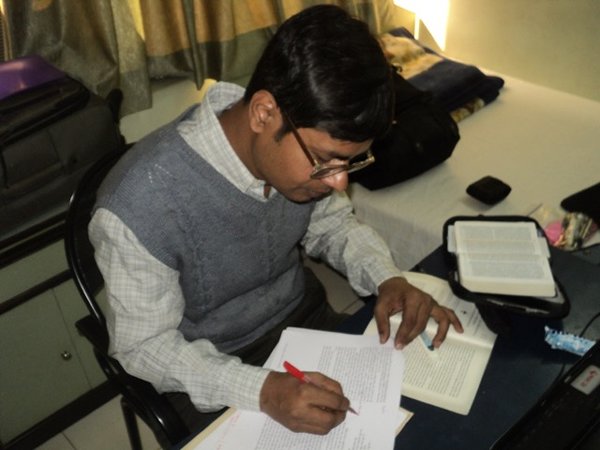Are Bengali-language resources so sparse that a Christian Bible study would attract Hindu and Muslim people?
Nearly 215 million people speak the Bengali language. The majority of these live in the country of Bangladesh or in the Indian states of West Bengal and Assam. While the Bible has been translated into Bengali, few other theology or discipleship books exist in this language, despite the vast number of speakers.
Gary Brewer founded the non-profit ministry Partners in Discipleship International (PDI) in 2009. As the name suggests, the ministry aims to fulfill the Great Commission—to make disciples of all nations—and hopes to accomplish this through the clear communication of God’s truth via translating theological resources. Although PDI conducts translation projects around the world, it focuses on languages spoken in Myanmar, India, and Thailand.
Brewer says the greatest need for many churches in Asia is more evangelism and discipleship resources. Due to the great lack of theological support for adults, PDI expanded from translating only children’s materials to adding theology books as well. He shares the story of one Burmese pastor who was so excited to have children’s Sunday school material translated into his native tongue that he studied its content for his own sermon use.
Partnerships Yield Resources
TGC International Outreach contacted PDI in December 2011 seeking to partner in translating resources into Bengali. Gary Brewer knew a more-than-qualified translation consultant in India who could oversee the proposed project. The two groups partnered for a Bengali translation of John Piper’s 50 Reasons Why Jesus Came to Die.
By 2013 the printer in southern India shipped 10,000 copies of the Bengali-version book to congregations in Kolkata, in West Bengal, and to pastors in the northeastern states of Assam and Delhi. Churches in Bangladesh received 2,000 copies.
Pastors and church leaders are eager for resources to help them better prepare to teach and lead, since Bengali speakers rely heavily on oral teaching due to low literacy rates. The Bengali copies of Piper’s book have aided them tremendously.

Kingdom-Building Resources
50 Reasons Why Jesus Came to Die is bearing fruit both within the church, for building up members and strengthening their faith, and outside the church, for winning the lost. Brewer has heard testimonies of believers in West Bengal inviting non-Christians to a group study of the book. They report that several people from Hindu and Muslim backgrounds have trusted in Christ after their exposure to the gospel through the book study.
Amit Paul, a pastor in Kolkata, served as one of the book’s translators and personally distributed 60 copies to students, pastors, and workers, including the principal of a Bible training institute in his city. Recipients expressed their gratitude for the Bengali book as it helped them to “understand more clearly why Jesus died.”
Pastor Paul also gave 2,000 copies to the Chattagram Baptist Society. He said his goal is to deliver a copy to every pastor and leader in Kolkata. “I thank God for all his provisions for this project,” he says, “and I pray that he will open the eyes of Bengali people to receive Christ as they study the book.”
Involved in Women’s Ministry? Add This to Your Discipleship Tool Kit.
 We need one another. Yet we don’t always know how to develop deep relationships to help us grow in the Christian life. Younger believers benefit from the guidance and wisdom of more mature saints as their faith deepens. But too often, potential mentors lack clarity and training on how to engage in discipling those they can influence.
We need one another. Yet we don’t always know how to develop deep relationships to help us grow in the Christian life. Younger believers benefit from the guidance and wisdom of more mature saints as their faith deepens. But too often, potential mentors lack clarity and training on how to engage in discipling those they can influence.
Whether you’re longing to find a spiritual mentor or hoping to serve as a guide for someone else, we have a FREE resource to encourage and equip you. In Growing Together: Taking Mentoring Beyond Small Talk and Prayer Requests, Melissa Kruger, TGC’s vice president of discipleship programming, offers encouraging lessons to guide conversations that promote spiritual growth in both the mentee and mentor.

































